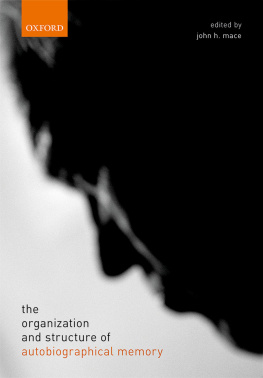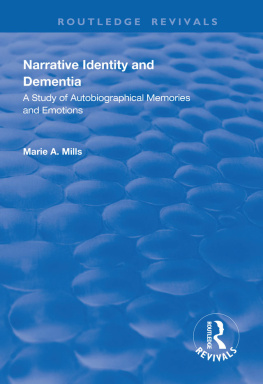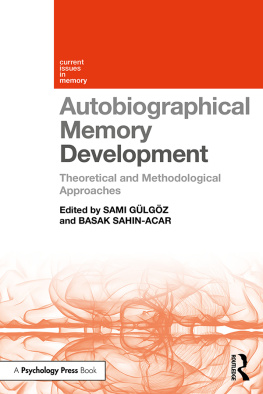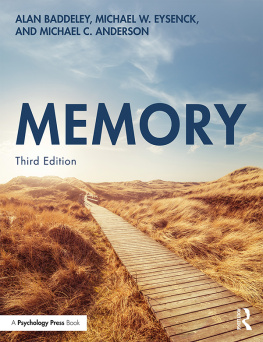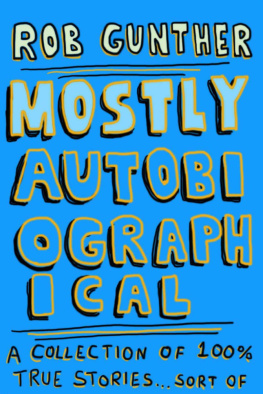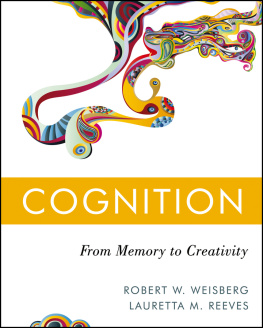The organization and structure of autobiographical memory

Great Clarendon Street, Oxford, OX2 6DP,
United Kingdom
Oxford University Press is a department of the University of Oxford. It furthers the Universitys objective of excellence in research, scholarship, and education by publishing worldwide. Oxford is a registered trade mark of Oxford University Press in the UK and in certain other countries
Oxford University Press 2019
The moral rights of the author have been asserted
First Edition Published in 2019
Impression: 1
All rights reserved. No part of this publication may be reproduced, stored in a retrieval system, or transmitted, in any form or by any means, without the prior permission in writing of Oxford University Press, or as expressly permitted by law, by licence or under terms agreed with the appropriate reprographics rights organization. Enquiries concerning reproduction outside the scope of the above should be sent to the Rights Department, Oxford University Press, at the address above
You must not circulate this work in any other form and you must impose this same condition on any acquirer
Published in the United States of America by Oxford University Press
198 Madison Avenue, New York, NY 10016, United States of America
British Library Cataloguing in Publication Data
Data available
Library of Congress Control Number: 2019946638
ISBN 9780198784845
eISBN 9780192513823
Oxford University Press makes no representation, express or implied, that the drug dosages in this book are correct. Readers must therefore always check the product information and clinical procedures with the most up-to-date published product information and data sheets provided by the manufacturers and the most recent codes of conduct and safety regulations. The authors and the publishers do not accept responsibility or legal liability for any errors in the text or for the misuse or misapplication of material in this work. Except where otherwise stated, drug dosages and recommendations are for the non-pregnant adult who is not breast-feeding
Links to third party websites are provided by Oxford in good faith and for information only. Oxford disclaims any responsibility for the materials contained in any third party website referenced in this work.
Contents
John H. Mace
David C. Rubin
Martin A. Conway, Lucy V. Justice, and Arnaud DArgembeau
Robyn Fivush and Theodore E. A. Waters
Qi Wang
Susan Bluck, Nicole Alea, and Emily L. Mroz
Heather Iriye and Peggy L. St. Jacques
Alexandra Ernst and Clare J. Rathbone
Jonathan Koppel and Dorthe Berntsen
John H. Mace and Amanda M. Clevinger
Nicole Alea
University of the West Indies at St Augustine, Trinidad & Tobago
Dorthe Berntsen
Center on Autobiographical Memory Research, Department of Psychology and Behavioural Sciences Aarhus University, Denmark
Susan Bluck
Department of Psychology, University of Florida, USA
Amanda M. Clevinger
Department of Psychology, Eastern Illinois University, USA
Martin A. Conway
Department of Psychology, City, University of London, UK
Arnaud DArgembeau
University of Lige, Belgium
Alexandra Ernst
Laboratory of Psychology and NeuroCognition, University of Grenoble-Alpes, France
Robyn Fivush
Department of Psychology, Emory University, USA
Heather Iriye
Department of Neuroscience, Karolinska Institute, Sweden
Lucy V. Justice
Department of Psychology, Nottingham Trent University, UK
Jonathan Koppel
Department of Psychology, University of Portsmouth, UK
John H. Mace
Department of Psychology, Eastern Illinois University, USA
Emily L. Mroz
Department of Psychology, University of Florida, USA
Clare J. Rathbone
Department of Psychology, Social Work and Public Health, Oxford Brookes University, UK
David C. Rubin
Department of Psychology & Neuroscience, Duke University, USA
Peggy L. St. Jacques
Department of Psychology, University of Alberta, Canada
Qi Wang
Department of Human Development, Cornell University, USA
Theodore E. A. Waters
New York University, Abu Dhabi, United Arab Emirates
John H. Mace
Introduction
Since ). The theme of the current volume, the organization and structure of autobiographical memory, is not only a topic of broad focus, but a fundamental question that it is pivotal to understanding the nature of autobiographical memory. Whereas it certainly can be said that such a question is important for any area of memory, it is, perhaps, particularly true for autobiographical memory, given the relative complexity of this topic. For example, questions concerning future thought, development, or function are either irrelevant in other areas (e.g., implicit memory), or they are relatively less dicey problems to solve (e.g., the question of function in semantic memory versus function in autobiographical memory).
In this introductory chapter, I sketch out some of the broad themes laid out in the individual chapters of this text. I present a very brief overview of the chapters, without any real commentary, or at least that is my impression. Readers who are intimately familiar with the topic, or those who normally like to skip overview chapters, can abandon ship now and go straight to the chapters. The chapters are written in a self-contained fashion, so one could easily move around the book without losing a particular thread or line of thought.
Summary of chapters
What is autobiographical memory? The simplest conception of autobiographical memory is to view it as synonymous with episodic memory () basic systems model. In the early chapters of this volume, each of these views is reviewed, updated, and extended.
In , Conway, Justice, and DArgembeau reprise, review, and extend the enormously popular SMS view. The model is updated with the incorporation of autobiographical future thought into the framework of the SMS. Given the central role of the self in the SMS approach, the model is well-suited to account for the burgeoning area of autobiographical future cognition, and, with this new addition, the SMS model increases its explanatory power and range.
The development of autobiographical memory is also a complex and rich question, perhaps more so than any other area of memory. Here, one must go beyond mere neural and cognitive development, as one considers how autobiographical memory develops within a sociocultural context (). Whereas cognitive psychology, in general, has not placed much emphasis on culture in the development of cognitive processes, autobiographical memory is (and should be) one exception.
In develops as individuals acquire cultural knowledge about the self and the purpose of the past.
The functional approach in the study of autobiographical memory has had considerable success (, Bluck, Alea, and Mroz review the functional perspective in the study of autobiographical memory. They take the position that form follows function, and that one needs to keep this notion in central focus when considering how autobiographical memory is organized. In advocating their view, they remind us of the pitfalls of relying on approaches to the study of autobiographical memory organization, and of remembering, that rely solely on mechanistic and reductionistic approaches. The authors review the three classic functions (directive, social, and self, Baddeley), and ask whether additional, as yet unnamed, functions are needed to properly frame the question of organization.

